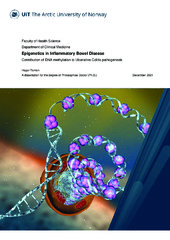Sammendrag
Ulcerative colitis (UC) is a chronic, inflammatory disease of the gastrointestinal tract, primarily affecting the colon. Along with Crohn’s disease (CD) they constitute the most common subtypes of inflammatory bowel disease (IBD). Genetic variants can only explain approximately 20 % of all IBD cases, indicating a more complex pathogenesis which is not fully understood. It has been implied that an interplay between environmental factors, intestinal microbiome, nutrition, and genetic variation contributes to UC development. It is also suggested that epigenetic modifications might have a role in IBD disease development.
Epigenetic modifications like DNA methylation can regulate gene expression via structural modifications of DNA. The main objective of this work is to investigate if DNA methylation contributes to UC pathogenesis. Newly diagnosed treatment-naïve UC patients with different disease phenotype and healthy controls were included in this study. Next generation sequencing (NGS) technology was applied to obtain transcriptomic and DNA methylation profiles of UC.
Our research shows that DNA methylation profiles differ according to disease severity and gender. The transcriptomic profiles for mild to moderate UC revealed genes regulating tissue-specific pathophysiological properties of tight junctions in the mucosa. Additionally, a gender-dependent pathogenesis of UC could be noted. Genes related to the preservation of mucosal integrity and detoxification of microbial-derived metabolites showed an increased expression in females. Genes related to anti-microbial, and cytotoxicity were found in males, indicating a higher risk for developing colorectal cancer (CRC). Correlations of the transcriptomic and DNA methylation profiles revealed a prominent promoter hypermethylation of genes related to homeostasis and defence, and promoter hypomethylation for genes related to immune response in mild to moderate UC. Surprisingly, the DNA methylation profile for severe UC revealed that hypomethylation were prominent in genes related to anti-inflammatory responses, indicating that hypomethylation might mitigate inflammation during severe UC.
These findings can be potentially useful for developing epigenetic drugs and allow new treatment strategies for UC patients in the future.
Har del(er)
Paper I: Taman, H., Fenton, C.G., Hensel, I.V., Anderssen, E., Florholmen, J. & Paulssen, R.H. (2018). Transcriptomic Landscape of Treatment-Naïve Ulcerative Colitis. Journal of Crohn’s and Colitis, 12(3), 327-336. Also available in Munin at https://hdl.handle.net/10037/12054.
Paper II: Taman, H., Fenton, C.G., Hensel, I.V., Anderssen, E., Florholmen, J. & Paulssen, R.H. (2018). Genome-wide DNA Methylation in Treatment-naïve Ulcerative Colitis. Journal of Crohn’s and Colitis, 12(11), 1338-1347. Also available in Munin at https://hdl.handle.net/10037/14020.
Paper III: Taman, H., Fenton, C.G., Anderssen, E., Florholmen, J. & Paulssen, R.H. (2021). DNA hypo-methylation facilitates anti-inflammatory responses in severe ulcerative colitis. PLoS ONE, 16(4), e0248905. Also available in Munin at https://hdl.handle.net/10037/21777.


 English
English norsk
norsk
